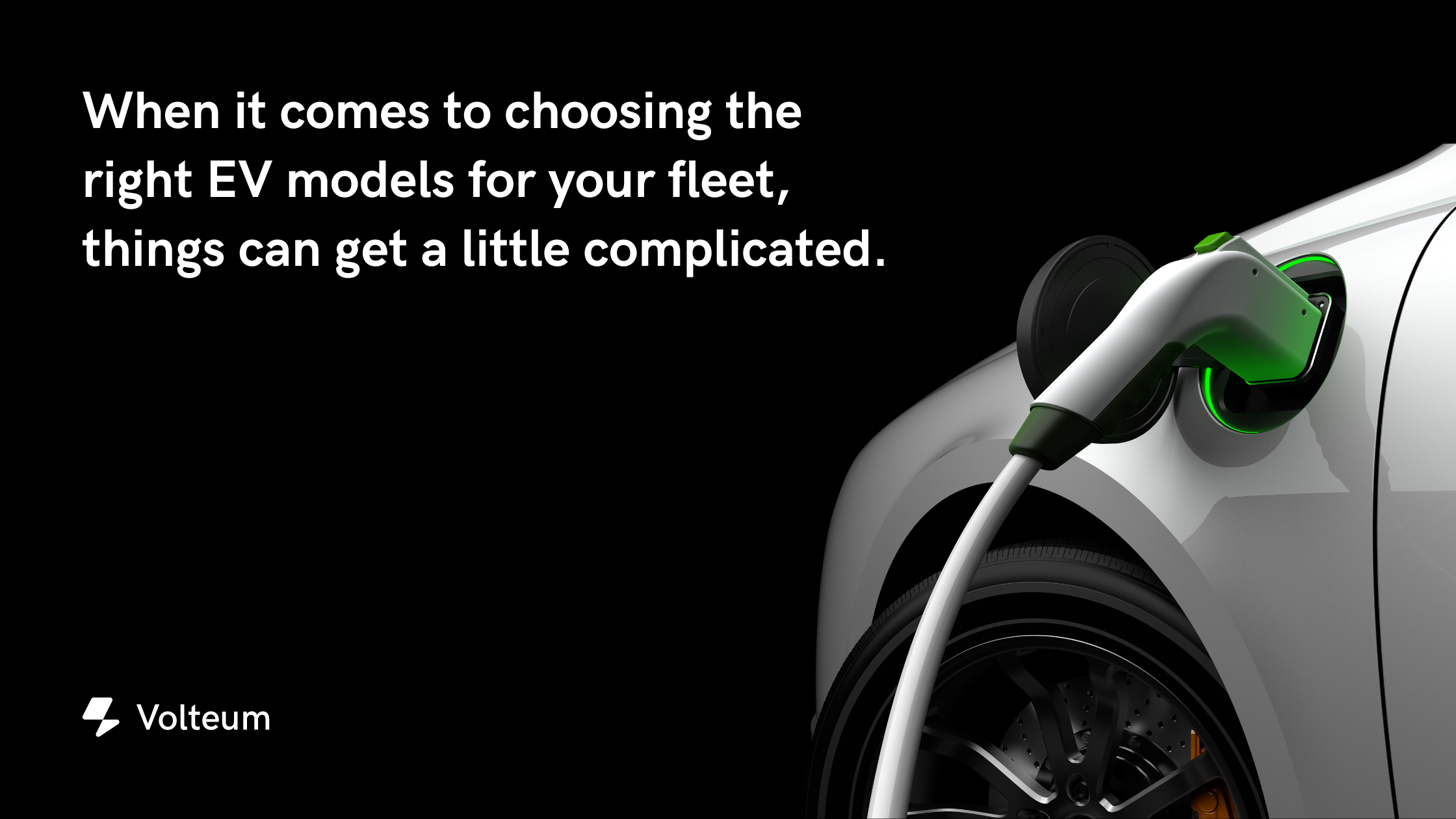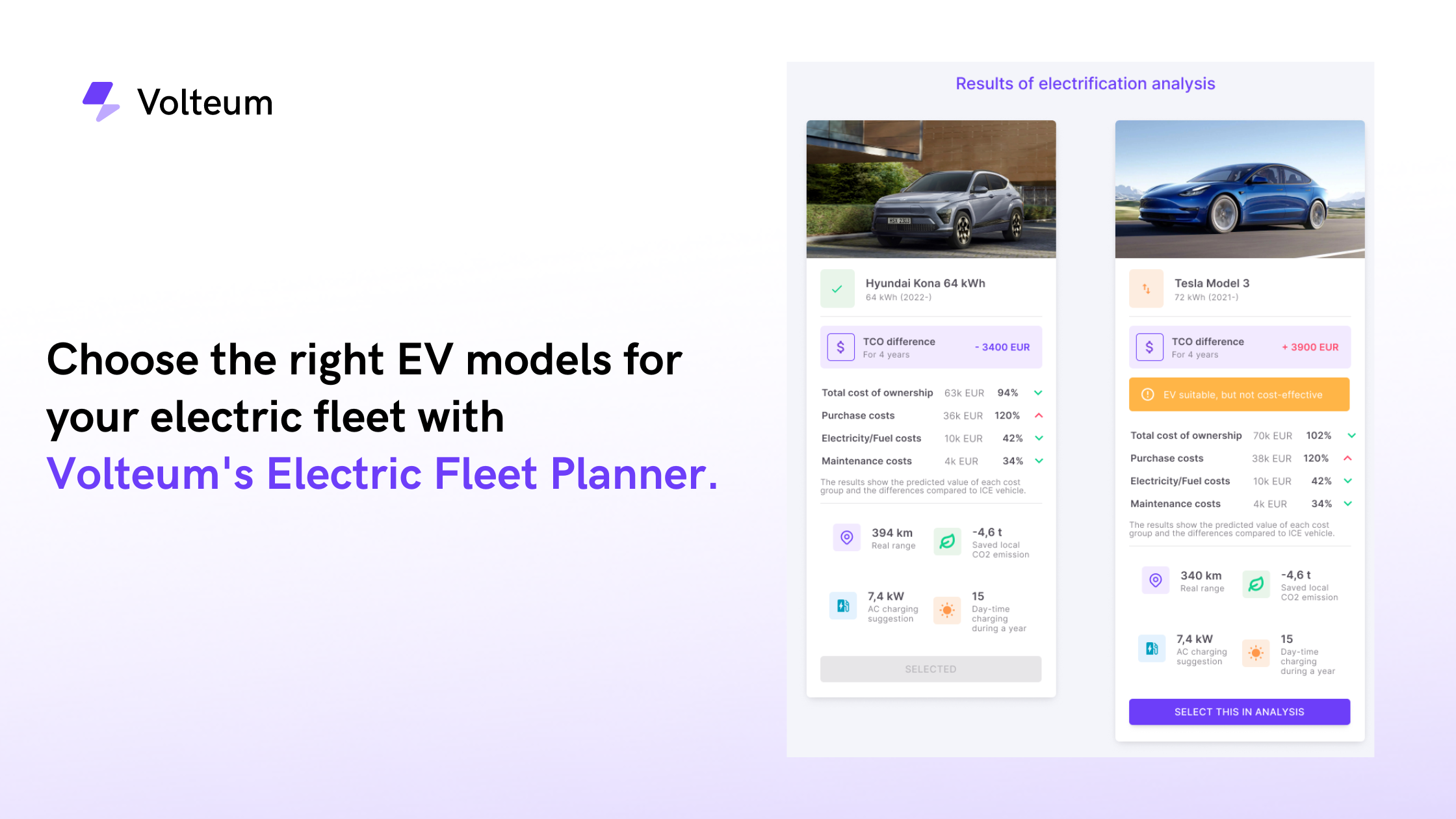Choosing the right EV models for your fleet: 12 factors to consider
Oct 08, 2023 · 7 min read · blog
Electric vehicles are becoming increasingly popular as a mode of transportation thanks to their sustainability and cost-effectiveness. However, when it comes to choosing the right EV models for your fleet, things can get a little complicated. In this blog post we have compiled a list of 12 factors that you should definitely keep in mind before making the decision!

1. Type of business

First and foremost, the type of business you own or operate in plays a significant role in choosing the right EV models for your fleet. For example, if you are in the food and beverage delivery business, you need to prioritize cargo space and refrigeration options in your EV selection. If you are in construction, you need enough space to transport tools and materials. Understanding your business needs and priorities will guide you in choosing the most suitable EVs for your fleet.

2. Vehicle range

The next thing you need to consider is the range of the vehicle you need. EVs have different ranges, and you need to choose the one that suits your business's needs. For example, if you mainly drive in the city, you can opt for an EV with a shorter range. However, if you need to cover long distances, you need to opt for an EV with a longer range. It's important to note that the range of EVs can vary based on factors such as weather conditions, driving style, and terrain.

3. Charging time

One of the major concerns while choosing EVs for your fleet is the charging time, as you need to make sure that it won’t not hold up your business operations. Some EVs take longer to charge than others, and you need to select one that works for your business. Additionally, you may consider installing charging infrastructure at your business site to reduce your reliance on public charging stations. This can also help save time and money in the long run.

4. Battery life

The battery life of EVs is another important factor to consider, as it impacts the overall performance and cost-effectiveness of the vehicles. Some EVs come with longer battery warranty periods, which means they will have a longer lifespan. You need to consider your business's usage patterns and select an EV with a battery that can support your needs. It's also important to factor in the cost of replacing batteries when making your decision.

5. Payload capacity

Payload capacity is especially important if your business deals with deliveries or transporting heavy equipment. You need to ensure that the EV can handle the payload you need to carry. Some EVs may have less payload capacity compared to traditional gas-powered vehicles, so it's important to carefully consider your business needs.



6. Maintenance and repair

EVs have fewer moving parts compared to traditional vehicles, which means they require less maintenance. However, it's still important to factor in the cost of maintenance and repair when choosing an EV for your fleet. This can include battery replacements, software updates, and specialized training for mechanics. It's also important to check the availability of EV maintenance and repair services in your area.

7. Towing capacity

If your business needs towing capabilities, you need to ensure that the EV you choose fulfills this requirement. EVs have lower towing abilities compared to combustion-engine vehicles, but there are EVs available that can meet your towing needs. It's important to carefully research and compare the towing capacities of different EV models before making your decision.

8. Operational costs

The operational costs of EVs are lower than that of combustion-engine vehicles, but you still need to factor in costs such as maintenance, insurance, and taxes. The cost of the EV itself is also a factor to consider when choosing the right models for your fleet. You should also take advantage of any government incentives and tax credits offered for EVs, which can significantly reduce your operational costs and the total cost of ownership (TCO).

9. Driver comfort

EVs can have a different driving experience, and that can impact your drivers' comfort. You need to ensure that your drivers are comfortable driving the EVs you choose and do not face any challenges that could impact your business. Before making your decision, you can consider test driving different EV models and see which ones are the most suitable for your drivers.

10. Safety features

Safety should always be a top priority, and the same goes for choosing an EV for your fleet. You need to ensure that the EV you select has safety features such as blind-spot monitoring, lane departure warning, and emergency braking to keep your drivers and other road users safe. You should also consider any additional safety features available for your specific business needs, such as parking cameras for delivery vehicles or off-road capabilities for construction vehicles.

11. Brand reputation

When buying a car, the brand reputation is an essential factor in the decision-making process. This should also be the case when choosing the right EV models for your fleet. Make sure you research the brands and read reviews from other fleet operators to understand the reputation and reliability of the brand you are considering. This will help you make an informed decision and choose a reputable brand that can provide reliable EVs for your business needs.

12. Support and service

Finally, ensure that the electric vehicle dealerships you work with provide adequate support and service to keep your EVs' performance optimal. This support includes charging and maintenance infrastructure, technical support, and training. It is also crucial to choose dealerships with a wide network of service centers, so your EVs can be serviced efficiently in case of any issues.



Choose the right EV models for your electric fleet with Volteum

Choosing the right EV models for your fleet can be a daunting task, but using Volteum's Electric Fleet Planner can make the electrification process easy to navigate and quick to accomplish.
One of the main advantages of using Volteum's Electric Fleet Planner is its ability to conduct a thorough fleet analysis. The tool identifies which vehicles are suitable for electrification, providing recommendations that ensure informed decision-making from the start. This eliminates the guesswork involved in vehicle selection and aligns with the specific needs and patterns of your fleet.
The Planner also excels in customizing EV model selections based on historical activities, range, total cost of ownership (TCO), and driver preferences. By prioritizing the criteria that matter most to your operations, Volteum delivers precise outcomes tailored specifically to your needs, ensuring that the chosen EV models are a perfect fit.

Conclusion

In conclusion, the process of selecting the right electric vehicle models for your fleet, while potentially challenging, is a crucial part of fleet optimization. From range and charging time to safety features and brand reputation, ensuring your EVs meet your business's specific needs is essential. Thus, careful consideration of these factors can lead to long-term cost savings, improved driver satisfaction, and a noticeable enhancement in your company's environmental responsibility. Therefore, it is not just a decision about vehicles, but a strategic move towards a future-ready, sustainable, and efficient business model.
